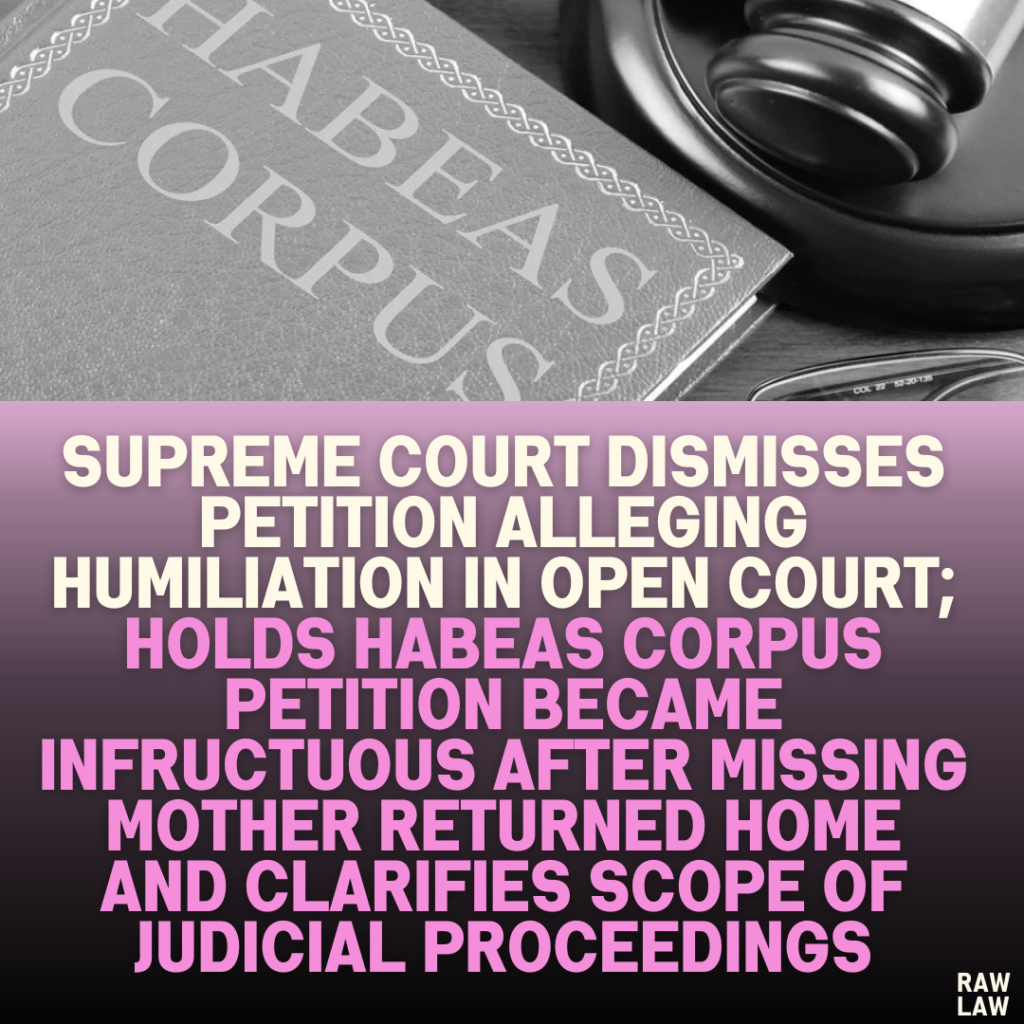Court’s Decision:
The Supreme Court dismissed the special leave petition filed by the petitioners, holding that their grievances about alleged humiliation during court proceedings were “totally misconceived.” The Court reiterated that a habeas corpus petition becomes infructuous when the missing person returns, leaving no scope for further legal action. It further held that the petitioners’ subsequent review petitions and applications lacked merit and were an abuse of the legal process.
Facts:
- The petitioners had filed a habeas corpus petition in the Rajasthan High Court, alleging that their mother was unlawfully detained by private respondents.
- During the pendency of the habeas corpus petition, their mother returned home. Consequently, the High Court dismissed the petition as infructuous on July 4, 2024.
- The petitioners alleged that, during the habeas corpus proceedings, police officials made statements about petitioner no. 1’s marital status, claiming a divorce decree was passed, and her husband had remarried. Petitioner no. 1 sought a direction from the High Court requiring police officials to clarify these statements.
- The petitioners filed a review petition challenging the dismissal of the habeas corpus petition, which was dismissed on July 23, 2024.
- Subsequently, a miscellaneous application was filed by the petitioners, demanding an explanation from the police regarding the basis for their statements. This application was also dismissed by the High Court, prompting the petitioners to file the present special leave petition in the Supreme Court.
Issues:
- Whether the High Court erred in dismissing the habeas corpus petition as infructuous after the mother’s return.
- Whether the statements made by the police regarding petitioner no. 1’s marital status during court proceedings caused humiliation or defamation.
- Whether the petitioners’ review petitions and miscellaneous applications raised valid grievances.
Petitioner’s Arguments:
- The petitioners, appearing in person, contended that the High Court erred in dismissing the habeas corpus petition without addressing their grievances regarding the police officials’ statements about petitioner no. 1’s marital status.
- Petitioner no. 1 argued that the statements made by the police were defamatory and caused her humiliation in open court.
- They sought an explanation from the police for the alleged remarks and challenged the High Court’s dismissal of their review petition and miscellaneous application.
Respondent’s Arguments:
- The respondents argued that the habeas corpus petition became infructuous once the mother returned home, and the High Court was correct in dismissing it.
- They emphasized that the statements made by police officials during court proceedings were not defamatory and did not cause any harm to petitioner no. 1.
- The respondents asserted that the petitioners’ subsequent legal actions were baseless and aimed at prolonging a resolved matter.
Analysis of the Law:
- Nature of Habeas Corpus Petitions: The Supreme Court reiterated that the primary purpose of a habeas corpus petition is to secure the release of a person unlawfully detained. Once the missing individual is located or released, the petition loses its purpose and becomes infructuous.
- Statements Made During Court Proceedings: The Court emphasized that statements made during judicial proceedings, even if uncomfortable, are part of the court’s truth-finding process and cannot be construed as defamatory or humiliating unless there is clear evidence of intent to harm.
- Limits of Review and Miscellaneous Applications: The Court held that review petitions and miscellaneous applications must demonstrate substantive legal grounds for reconsideration. In this case, the petitioners failed to provide any legal basis for their demands.
Precedent Analysis:
- The Court relied on established jurisprudence affirming the limited scope of habeas corpus proceedings, which become infructuous once the detained person is no longer missing or detained.
- It highlighted that courts cannot entertain collateral grievances unrelated to the primary issue in habeas corpus cases.
Court’s Reasoning:
- The Supreme Court observed that the High Court’s dismissal of the habeas corpus petition as infructuous was justified since the petitioners’ mother had returned home. It stated that “nothing was left in the matter” after the mother’s return.
- Regarding the alleged humiliation, the Court clarified that statements made during judicial proceedings are part of the process to ascertain the truth. It remarked:“During court proceedings, many statements are made and questions are posed which may make a person uncomfortable, but all such statements or questions cannot be misconstrued as humiliating a person.”
- The Court found no evidence to support the petitioner’s claims that the police officials’ statements about petitioner no. 1’s marital status were intended to harm or defame her. It further noted that the petitioners’ repeated legal filings were unnecessary and lacked merit.
Conclusion:
The Supreme Court dismissed the special leave petition, terming the petitioners’ grievances “totally misconceived.” It held that the habeas corpus proceedings had already reached a “quietus” with the mother’s return, leaving no room for further adjudication. The Court also dismissed the petitioners’ prayers as “unusual and unwarranted.”
Implications:
- Clarity on Scope of Habeas Corpus: The judgment reinforces that habeas corpus petitions are limited to addressing unlawful detention and cannot be used to pursue unrelated grievances or collateral issues.
- Statements in Court Proceedings: The ruling clarifies that statements made during judicial proceedings are part of the process of truth-finding and do not automatically amount to defamation or humiliation.
- Discouragement of Frivolous Petitions: By dismissing the petitioners’ repeated legal actions, the Court emphasized the importance of avoiding unnecessary and baseless litigation, which burdens the judicial system.




Pingback: Bombay High Court Dismisses Appeal Against Arbitral Award in Share Transfer Dispute: “Judicial Intervention in Arbitration Matters Must Be Minimal; No Patent Illegality Found” - Raw Law